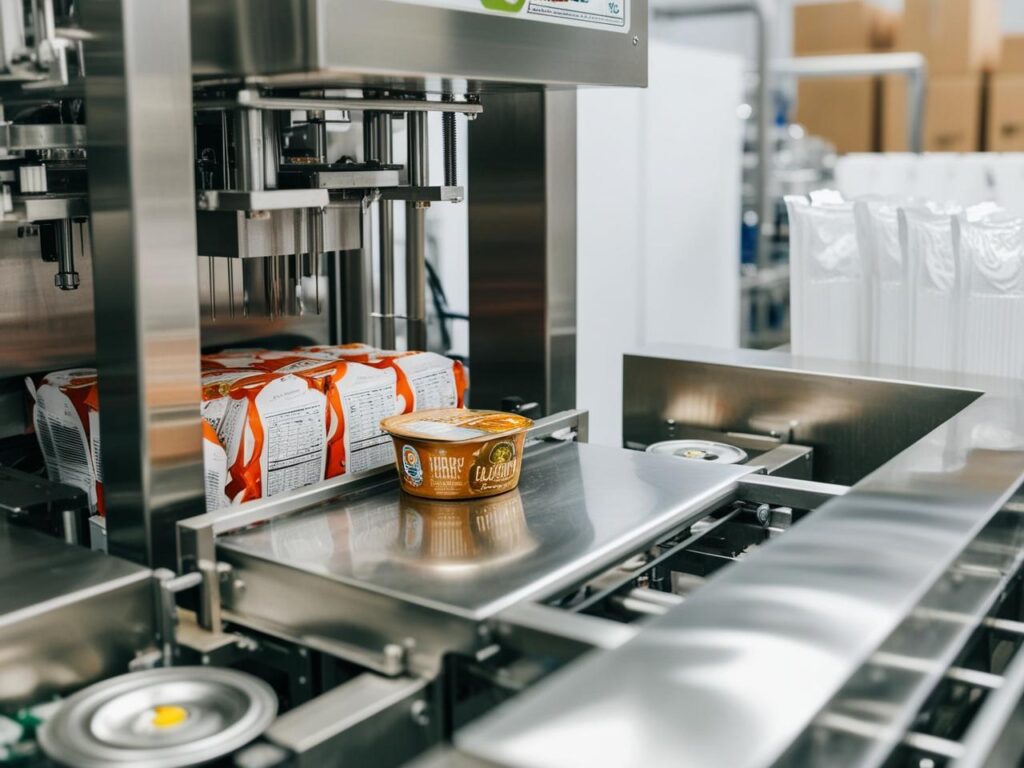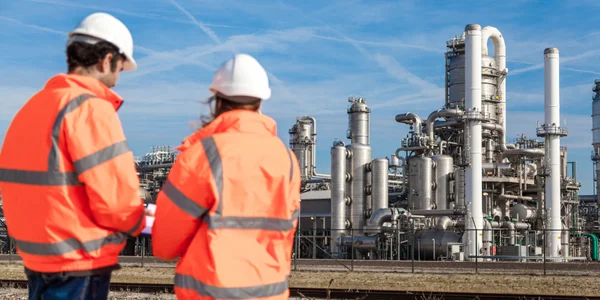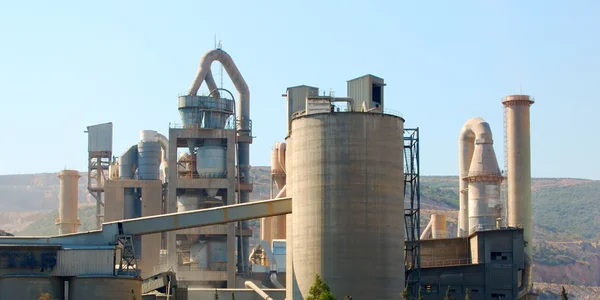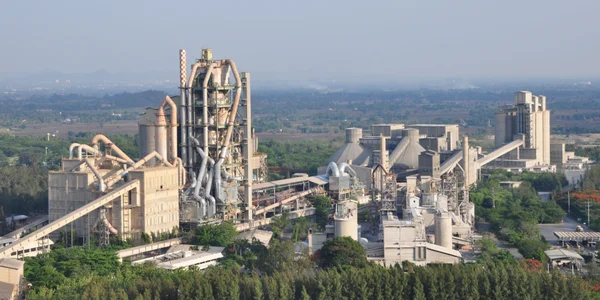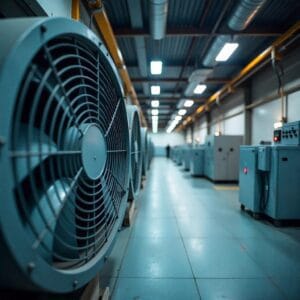Biura
SIEDZIBA GŁÓWNA

Niemcy
- Intensywny filtr Himenviro Technologies GmbH
Neustraße 45 - 49, 42553, Velbert, Deutschland/Niemcy - +49 20534200990
BIURO REGIONALNE

Wielka Brytania
- Intensiv Filter Himenviro UK Limited
47, Bath Street WS13BX, Wallsall West Midlands, Wielka Brytania - +44 1922 628893
BIURO REGIONALNE

Emiraty Arabskie
- Intensywny filtr Himenviro Technologies FZE – LLC
Centrum biznesowe, Szardża Publishing City Free Zone, Szardża, ZEA - +971-556074697
BIURO REGIONALNE

Indie
- Intensiv-Filter Himenviro Private Limited
D-247/11, Sektor-63, Noida - 201301, Uttar Pradesh, Indie - +91-120-4642-500
BIURO REGIONALNE

Indie
- Intensiv-Filter Himenviro Private Limited
D-247/11, Sektor-63, Noida - 201301, Uttar Pradesh, Indie - +91-120-4642-500
BIURO REGIONALNE

Indie
- Intensiv-Filter Himenviro Private Limited
D-247/11, Sektor-63, Noida - 201301, Uttar Pradesh, Indie - +91-120-4642-500
Rozwiązania w zakresie filtracji powietrza i pyłu w przemyśle spożywczym
Przemysł spożywczy i napojowy to złożony i ściśle regulowany sektor, który opiera się na precyzyjnych procesach i rygorystycznych standardach higieny. Jednym z kluczowych aspektów utrzymania tych standardów jest skuteczna kontrola zapylenia. Procesy takie jak przeładunek ziarna, mieszanie, blendowanie i pakowanie generują drobne cząsteczki pyłu, które mogą zanieczyszczać produkty, stanowić zagrożenie dla zdrowia pracowników i stwarzać potencjalne zagrożenie wybuchem.
Aby sprostać tym wyzwaniom, oferujemy zaawansowane rozwiązania filtracyjne Zaprojektowane specjalnie dla przemysłu spożywczego i napojów. Nasze systemy zostały zaprojektowane tak, aby wychwytywać i usuwać cząsteczki pyłu, zapewniając czystość produktu, bezpieczeństwo pracowników i zgodność z przepisami.
Proces filtracji pyłu w przemyśle spożywczym
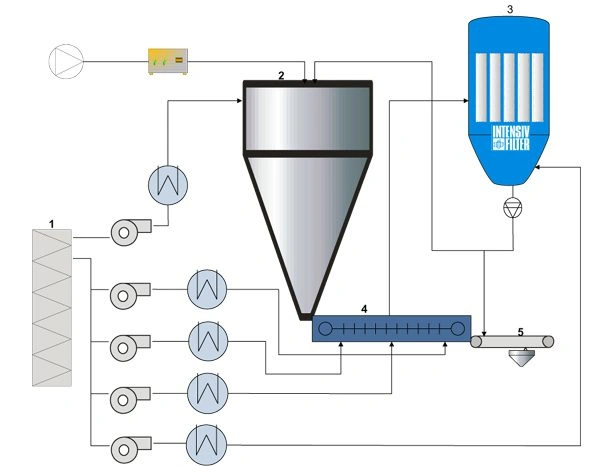
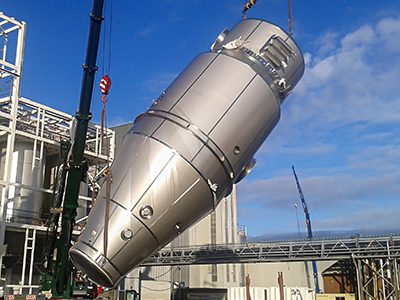
- 1. Filtr zewnętrzny
- 2. Suszarka rozpyłowa
- 3. Filtr CIP
- 4. Zewnętrzne złoże fluidalne
- 5. Wypełnienie
Wymagana specyfikacja dla filtra CIP
Typowe dane projektowe | Filtr CIP |
|---|---|
Objętość gazu | < 230 000 m³/godz. |
Temperatura gazu | 80-90 °C |
Rodzaj pyłu | Produkty mleczne w proszku |
Zawartość pyłu resztkowego | < 10 g/m³ |
Zawartość pyłu w gazie surowym | 20 mg/m³ |
Czyszczenie | W sieci |
Medium filtracyjne | Poliester |
Konstrukcja odporna na wybuch | Tak |
Sorbent |
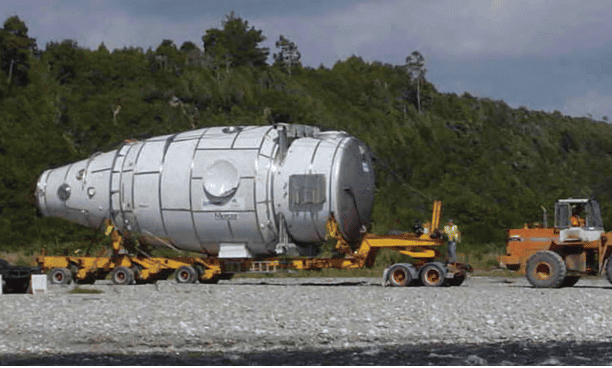
Nasze produkty Zastosowanie w przemyśle spożywczym

Zatrzymywanie pyłu powstającego podczas transportu materiałów sypkich, takich jak ziarna, proszki i płatki.
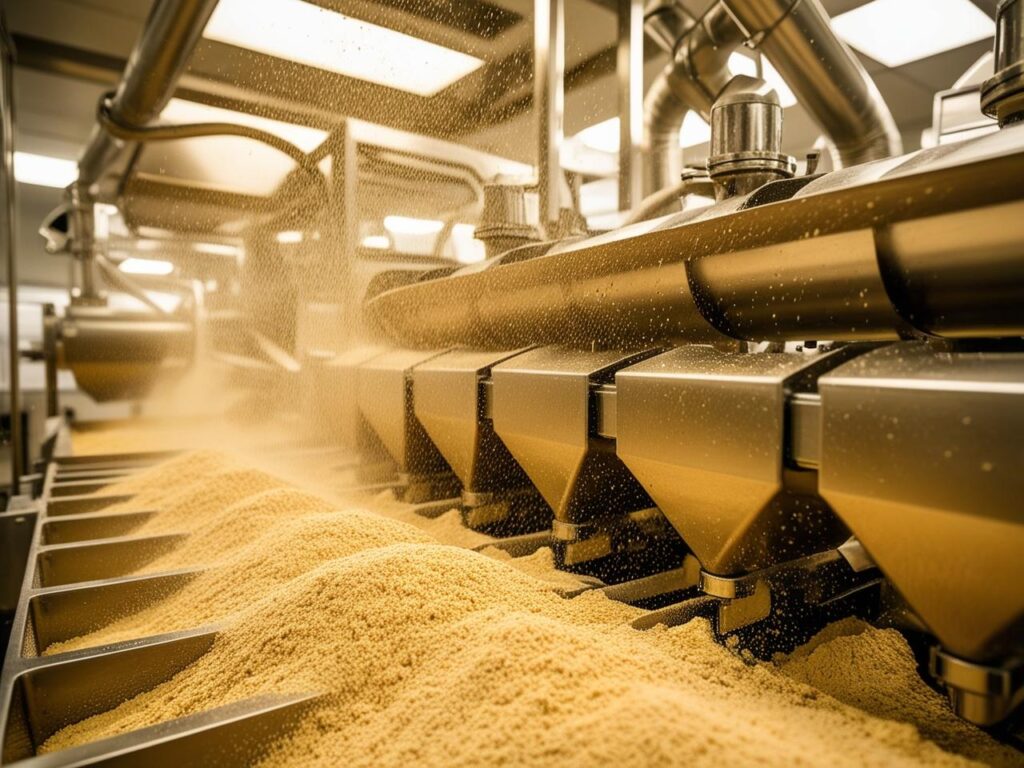
Kontroluj emisję pyłu pochodzącą z procesów wymagających dużej ilości energii, takich jak mielenie, rozdrabnianie i rozdrabnianie.
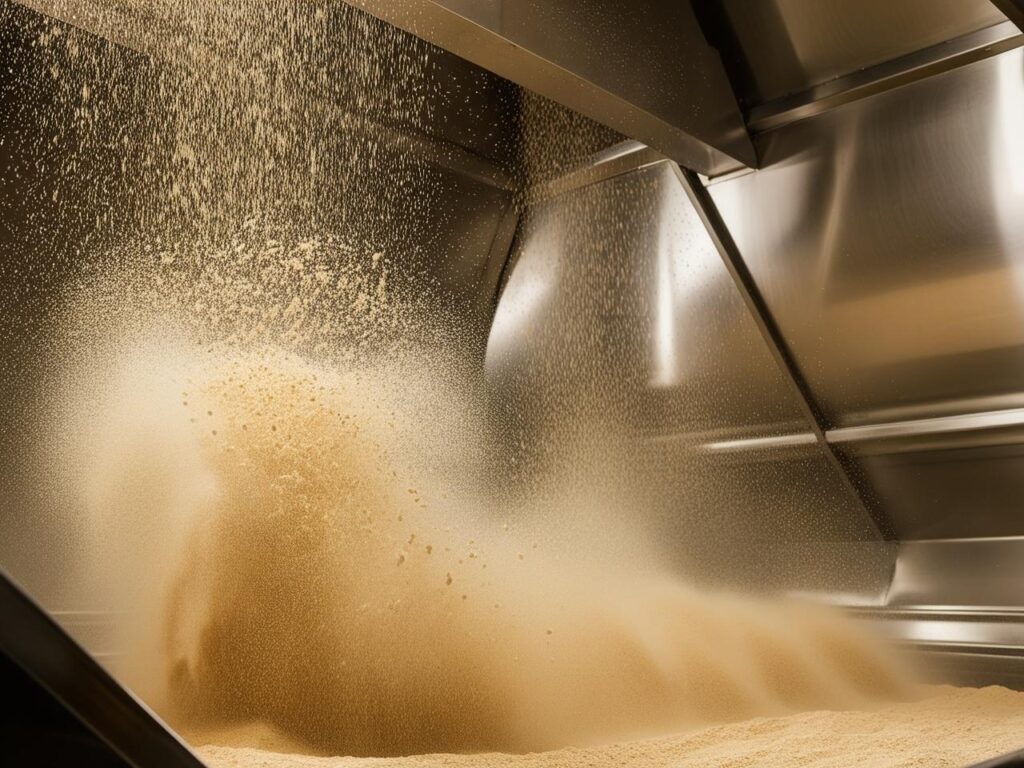
Krajobraz regulacyjny w zakresie kontroli zapylenia |
|---|
Przepisy dotyczące bezpieczeństwa żywności |
Przestrzeganie norm FDA i USDA |
Zdrowie i bezpieczeństwo pracowników |
Zgodność z przepisami OSHA |
Zapobieganie pożarom i wybuchom |
Wdrażanie norm NFPA |
Ochrona środowiska |
Jakość i spójność produktu |
Zmniejszenie przestojów i kosztów konserwacji |
Wyzwania związane z kontrolą zapylenia |
|---|
Zanieczyszczenie produktu |
Zagrożenia dla zdrowia pracowników |
Zagrożenia pożarem i wybuchem |
Zgodność z przepisami |
Zanieczyszczenie krzyżowe |
Wzrost mikroorganizmów |
Przestrzeganie ścisłych zasad bezpieczeństwa żywności |
Obniżona jakość produktu |
Uszkodzenie sprzętu |
Kluczowe kwestie dotyczące skutecznej kontroli zapylenia |
|---|
Wdrożenie skutecznego wychwytywania pyłu |
Zapewnij odpowiedni przepływ powietrza i ciśnienie |
Produkty mleczne w proszku |
Wykorzystuj systemy filtracji o wysokiej wydajności |
Regularna konserwacja i przeglądy |
Przestrzegaj standardów branżowych |
Regularnie oceniaj system kontroli zapylenia |
Rozważania specyficzne dla procesu |
Ocena i ograniczanie ryzyka |
Skontaktuj się z nami, aby uzyskać fachową konsultację
Poznaj nasze inne usługi!
Często zadawane pytania
W przetwórstwie żywności, powszechne systemy filtracji obejmują filtry membranowe (takie jak mikrofiltracja, ultrafiltracja, nanofiltracja i odwrócona osmoza), filtry wgłębne, filtry z węglem aktywnym oraz systemy naświetlania ultrafioletem (UV). Technologie te służą do usuwania zanieczyszczeń fizycznych, chemicznych i biologicznych, zapewniając czystość i bezpieczeństwo produktu.
Systemy filtracji zapewniają zgodność z normami bezpieczeństwa żywności poprzez skuteczne usuwanie zanieczyszczeń, w tym mikroorganizmów, cząstek stałych i pozostałości chemicznych, z surowców i produktów. Ten proces oczyszczania pomaga spełnić wymogi regulacyjne i utrzymać wysokie standardy jakości finalnych produktów spożywczych.
Systemy filtracji utrzymują jakość i spójność produktu poprzez usuwanie niepożądanych cząstek stałych, mikroorganizmów i innych zanieczyszczeń ze składników i produktów końcowych. Gwarantuje to, że każda partia spełnia wymagane standardy czystości i jakości, co przekłada się na jednolitość smaku, wyglądu i bezpieczeństwa wszystkich produktów.
